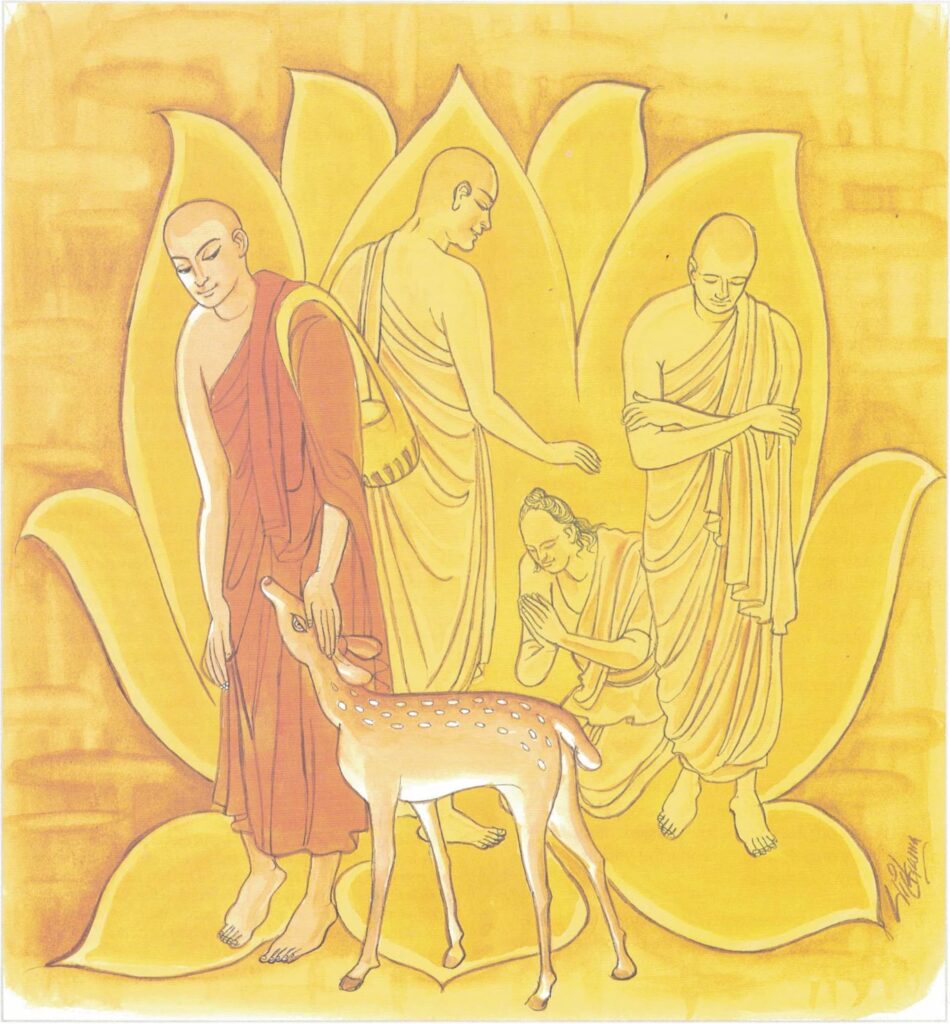Pali text, illustration and English translation of Dhammapada verse 378:
santakāyo santavāco santavā susamāhito |
vantalokāmiso bhikkhu upasanto’ti vuccati || 378 ||
378. That bhikkhu calmed of body, speech, calmed and well-composed of mind, who world-enjoyments has renounced, ‘one calmed’ indeed is truly called.

The Story of Venerable Santakāya
There was a monk named Santakāya, who had been a lion in his past existence. It is said of this monk that he was never guilty of any improper movement of hand or foot. He never yawned or stretched out his arms and legs, but always carried himself with composure and dignity. The story goes that this Venerable issued from the womb of a lioness. It is said of lionesses that if on any day they find prey, they enter one or another of the caves of silver, gold, jewels, and coral, and lie for the space of seven days on beds composed of the powder of red arsenic and yellow orpiment. On the seventh day they arise and survey the beds where they have lain, and if they notice that by reason of the movement of their tails or ears or forefeet or hindfeet, the powder of red arsenic and yellow orpiment has been scattered about, they say to themselves, “This does not become your birth or lineage,” and lie down again and fast for seven days more. Then, provided the powder has not been scattered about, they say to themselves, “This becomes your birth and lineage,” come forth from their lairs, yawn and stretch themselves, take a view of the cardinal points, roar the lion’s roar three times, and go forth in search of prey. From the womb of such a lioness as this did this monk issue forth.
The composure and dignity of this monk attracted the attention of the other monks, and they said to the Buddha, “Venerable, we have never seen such a monk as Venerable Santakāya: for when he assumes a sitting posture, he never moves his hands; he never moves his feet; he never yawns, or stretches out his arms and legs.” When the Buddha heard this, he said, “Monks, he that is a monk should be, like Venerable Santakāya, composed in action, speech, and thought.”
Explanatory Translation (Verse 378)
santakāyo santavāco santavā susamāhito
vanta lokāmiso bhikkhu upasanto iti vuccati
santakāyo [santakāya]: restrained in body; santavāco [santavāca]: restrained in speech; santavā: restrained in mind; susamāhito [susamāhita]: who is totally disciplined; vanta lokāmiso [lokāmisa]: who has abandoned material things; upasanto iti vuccati: is described as wholly tranquil
For a monk to be wholly and completely tranquil, he must be restrained in body and speech. This discipline derives from the restraint of mind. Then, when these three forms of restraints have been achieved, the monk is automatically wholly and completely tranquil.
Commentary and exegetical material (Verse 378)
This verse is related to the exemplary restraint in demeanour of a monk whose name, Santakāya, echoes his behaviour (subdued in body). In the story that gives rise to the verse, the Venerable is described as having ‘issued from the womb of a lioness’. This story goes on to describe the noble habits of a lioness. The Buddha has, in one context, referred to himself, too, as a lion, as he seemed to be impressed by the noble qualities of lions.
The Buddha said, “Monks, the lion, king of beasts, at eventide comes forth from his lair. He stretches himself. Having done so, he surveys the four quarters in all directions. Having done that, he utters thrice his lion’s roar. Having thrice spoken his lion’s roar, he sallies forth in search of prey.
Now, monks, whatever animals hear the sound of the roaring of the lion, king of beasts, for the most part, they are afraid; they fall to quaking and trembling. Those that dwell in holes seek them; water-dwellers make for the water;forest-dwellers enter the forest; birds mount into the air. Then whatsoever ruler’s elephants in village, town or palace are tethered with stout leather bonds, they burst out and rend those bonds asunder; void their excrements and in panic run to and from. Thus potent, monks, is the lion, king of beasts, over animals. Of such mighty power and majesty is he. Just so, monks, when a Buddha arises in the world, an arahat, a perfectly enlightened one, perfect in wisdom and in conduct, welfarer, knower of the worlds, the unsurpassed trainer of those who can be trained, teacher of deities and of men, a Buddha, an exalted one. He teaches the Dhamma. Such is the self; such is the way leading to the ending of the self.